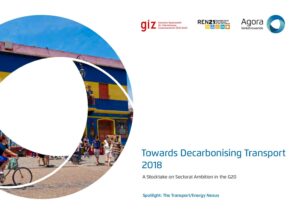The extreme weather events of 2018 have given us a taste of things to come if man-made climate change continues at its current pace. Although the international community took a step in the right direction in Paris three years ago by resolving to keep the global temperature rise well below 2 degrees Celsius, global emissions of greenhouse gases continue to increase. The objective of preventing “dangerous anthropogenic interference with the climate system” seems as distant today as in 1992, when world leaders formally ratified the UN Convention on Climate Change at the Rio Earth Summit.
The transport sector is responsible for roughly one quarter of emissions from the burning of fossil fuels, with road traffic being the largest culprit. Most transport emissions are produced by G20 countries, and emission levels are still rising. However, if we are to meet the Paris climate target, those emissions must drop to near zero by 2050. This represents an enormous challenge, and one we must begin addressing now. For it involves more than merely replacing internal combustion engine vehicles with electric ones. We also need to transform the entire transport system and couple it to the electricity sector.
There is no single solution to making the transport sector carbon neutral. We need a multitude of measures – including some measures that are currently controversial. One thing is certain: if we postpone necessary measures, future efforts to keep global warming below the 2-degree mark will have to be all the more radical.
This study provides a clear picture of the state of G20 transport emissions, analyses already existing approaches for decarbonising the transport sector, and stresses the urgency of putting ambitious climate action on the political agenda. In the process, we hope to promote discussions about climate friendly transport, not just in G20 countries but everywhere. After all, the transformation of the transport sector can succeed only when the entire international community works together.


